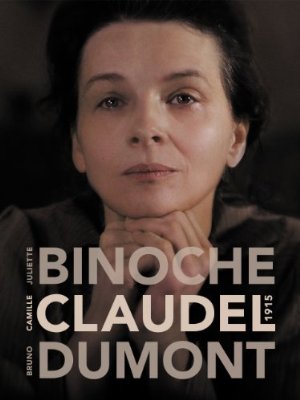Camille Claudel 1915 Review
By Rich Cline
With a stripped-down, bare-faced performance, Juliette Binoche is utterly wonderful in this tense French drama. Based on the real story of artist Camille Claudel, who was locked in an asylum by her family, the film is an unofficial sequel to the 1988 biopic. And it also continues to provocatively explore the impact of religion in society that has infused writer-director Bruno Dumont's work from La Vie de Jesus (1997) to Outside Satan (2011).

The film picks up Camille's story after she has split up with the sculptor Rodin and established herself as an artist in Paris. But her family is worried that she is living the wrong kind of life, so in 1913 they had her committed to an isolated psychiatric hospital. Over the next two years, her doctor (Robery Leroy) and the attending nuns know that she shouldn't be here, especially since the constant noise from the inmates interferes with any attempt to carry on with her work. When her younger brother Paul (Jean-Luc Vincent) comes for a visit, Camille hopes that he'll finally agree to let her out, but his intense religious believes convince him that the arts are evil and that the best way to care for his sister is to cruelly lock her away.
Yes, Dumont is drawing all kinds of parallels here with modern society and the fears people have of art they don't understand, which would probably include many of Dumont's films. But aside from a brief section that centres on Paul, the film is tightly focussed on Camille, and Binoche lets us see right through her. It's a wrenchingly raw performance that reveals all of Camille's conflicting inner emotions, with glimmers of hope and even bliss as well as the deep yearning to have her old life back so she can once again express herself artistically. By locking in so closely on Camille, Dumont and Binoche force us to experience her incarceration with her, including the daily irritations and small mercies.
Sometimes this depiction of mental patients is darkly disturbing, bordering on horrific, but Dumont finds the humanity in each of the other patients, as well as the nuns, doctor and priest. It's the church itself that's the villain here, controlling society so fully that no one has a chance for proper treatment. This hospital is utterly cut off from the outside world: Camille can get snatches of news about the Great War, but nothing of the arts culture she so desperately misses being a part of. And in a sense, Camille is also trapped here by her own faith, as she is obedient to even this injustice. But Dumont never pounds any of these themes heavily; he just plants the seeds and lets us take it from there.

Facts and Figures
Year: 2013
Genre: Foreign
Run time: 95 mins
In Theaters: Wednesday 13th March 2013
Box Office USA: $22.5k
Budget: 1
Distributed by: Kino Lorber
Production compaines: 3B Productions, arte France Cinéma, C.R.R.A.V. Nord Pas de Calais, Canal+
Reviews
Contactmusic.com: 4 / 5
Rotten Tomatoes: 82%
Fresh: 36 Rotten: 8
IMDB: 6.5 / 10
Cast & Crew
Director: Bruno Dumont
Producer: Rachid Bouchareb, Jean Brehat, Muriel Merlin
Screenwriter: Bruno Dumont
Starring: Juliette Binoche as Camille Claudel, Jean-Luc Vincent as Paul Claudel, Emmanuel Kauffman as Le pretre, Marion Keller as Mile Blanc, Robert Leroy as Le medecin, Armelle Leroy-Rolland as La jeune soeur novice
Also starring: Rachid Bouchareb, Jean Brehat, Bruno Dumont














